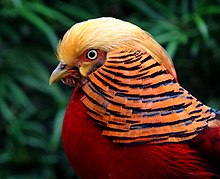Golden pheasant
| Golden pheasant | |
|---|---|
 |
|
| Male golden pheasant | |
| Scientific classification | |
| Kingdom: | Animalia |
| Phylum: | Chordata |
| Class: | Aves |
| Order: | Galliformes |
| Family: | Phasianidae |
| Subfamily: | Phasianinae |
| Genus: | Chrysolophus |
| Species: | C. pictus |
| Binomial name | |
|
Chrysolophus pictus (Linnaeus, 1758) |
|
The golden pheasant or Chinese pheasant (Chrysolophus pictus) is a gamebird of the order Galliformes (gallinaceous birds) and the family Phasianidae (pheasants). The genus name is from Ancient Greek khrusolophos, "with golden crest", and pictus is Latin for "painted" from pingere, "to paint".
It is native to forests in mountainous areas of western China, but feral populations have been established in the United Kingdom, Canada, United States, Mexico, Colombia, Peru, Bolivia, Chile, Argentina, Uruguay, Falkland Islands, Germany, Belgium, Netherlands, France, Ireland, Australia and New Zealand. In England they may be found in East Anglia in the dense forest landscape of the Breckland as well as Tresco on the Isles of Scilly.
The adult male is 90–105 cm in length, its tail accounting for two-thirds of the total length. It is unmistakable with its golden crest and rump and bright red body. The deep orange "cape" can be spread in display, appearing as an alternating black and orange fan that covers all of the face except its bright yellow eye with a pinpoint black pupil.
...
Wikipedia

